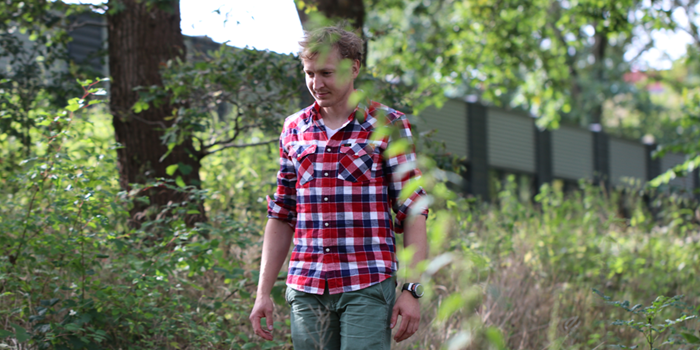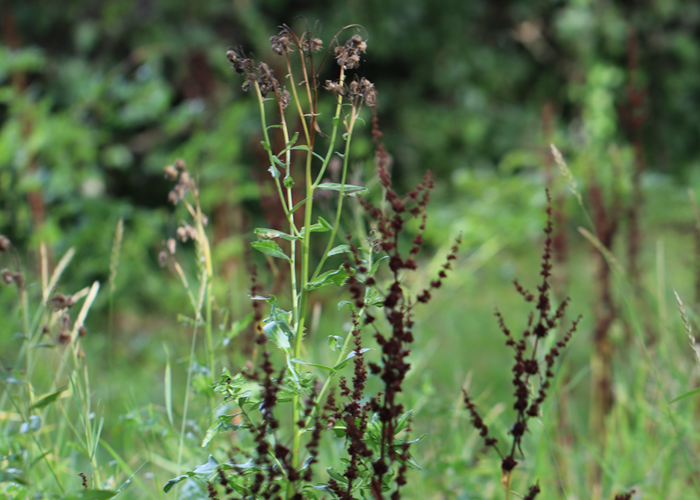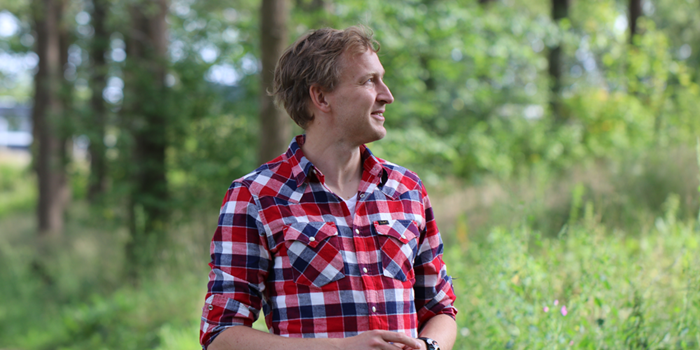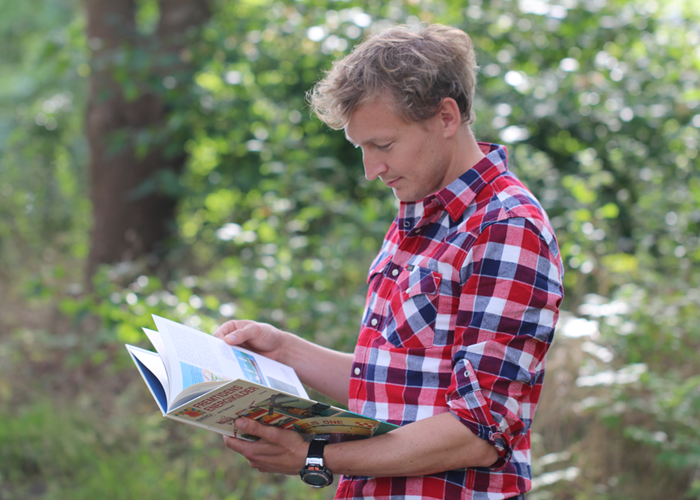Christian Bille Jendresen has taken the big leap from academia to business in the start-up Cysbio – a company originating from DTU Biosustain. Today, he is Director of R&D, Sulfation Technologies at Cysbio, where he does everything from drawing up blueprints for new laboratories to HR and IT-related tasks.
Christian Bille Jendresen flips the pages of a more than 30-year old book called ‘Fremtidens Energikilder’ (Future Energy Sources). He got the book from his father as a young kid.
“The green technologies and the understanding of environmental issues were already there in the 1980’s – it was so fascinating to me,” Christian Bille Jendresen says. He looks at a drawing of an offshore wind turbine with two blades and a tower of reinforced concrete painted in red and white.
“Ah, well – you wouldn’t build them like this today. But the technology was there, it just had to be developed a bit further,” he says.
This book sparked his interest in sustainability and green technologies. As a teenager he had a job as a check-out assistant in a kiosk at Gentofte Hospital. Instead of spending his salary on candy, he bought wind turbine stocks.
“My interest in consumer goods was never that big, neither was my candy consumption,” as he puts it.
Today, he is Director of R&D, Sulfation Technologies at Cysbio – a start-up company originating from The Novo Nordisk Foundation Center for Biosustainability (DTU Biosustain) at DTU.

A goodbye to academia
By the end of high school he knew that he would do something in the field of Chemistry and Technology. He was enrolled at DTU for a Master’s degree in Biotechnology, and during this period also travelled to the US and Singapore.
After finishing his PhD, working short-term as a postdoc at DTU Systems Biology (now Bioengineering) and a minor detour in the industry, he was drawn to the mission of the Novo Nordisk Foundation Center for Biosustainability. Therefore, he joined Professor Alex Toftgaard Nielsen’s group once the Center was inaugurated. A research grant from the Novo Nordisk Foundation allowed him to advance within the scientific area. By then, he had already contributed vastly to the maturation of the technology behind Cysbio. One thing led to another, and today he is working full-time as a Co-Founder of Cysbio.
Leaving DTU in favour of the private sector is with mixed feelings.
“It is not straightforward to get a chance to pursue your research ideas, and leaving for industry has been a bit daunting. I think the world of entrepreneurship has always been an exciting opportunity, but it also comes with risks: you always face the problem of financing. Now, we are fortunate to have funding and a business model that works.”

Start-ups need universities
Cysbio has developed technologies that enables them to produce amino acids and sulphated molecules biologically using engineered E. coli as cellular workhorses – cell factories. This spring, they landed an important deal of 5.5 Million Euro with the Chinese chemistry mammoth Zhejiang NHU.
Christian Bille Jendresen believes that transformative technologies that change the world as well as starting companies like Cysbio benefit from university environments to mature and get investments:
"It is not straightforward to get a chance to pursue your research ideas, and leaving for industry has been a bit daunting."
Director of R&D, Sulfation Technologies at Cysbio – a start-up company from DTU Biosustain
“Most investors are reluctant to invest in anything new and unknown that might take 10-15 years of research to commercialise – and which has a high risk of failing. Therefore, projects like these clearly belong in the world of academia or incubation environments until they reach a fairly advanced stage of maturity. Early phase biotech investments and incubation options are fortunately starting to grow.”
When he took the big leap and became employed at Cysbio this was at the same time a goodbye to the world of academia – and Christian Bille Jendresen explains why this is probably for the good.
“We have kept our knowledge close all the way in order to be able to patent and have some strong intellectual property rights. So, we've had a commercial aim right from the beginning. But you have to know that if you want to commercialize, you have already taken steps away from an academic career and towards industry,” he says and continues:
“It seems that there is not a strong history of scientists returning to academia. Nonetheless, I think scientists with industrial experience could bring value to academic research and education.”
He has filed and maintained six patent applications that are now finding their way into commercialisation.

DIY Director
Apart from maintaining a scientific program, doing HR-work, purchasing lab equipment, setting up computers, building their webpage and – for the time being – taking care of his youngest on paternity leave, he is also involved in building their new laboratories, which will be situated in the DTU Science Park in Hørsholm. The latter involves many unexpected tasks like ensuring proper drainage, good equipment access, ventilation and suitable electrical installations.
Not only do you learn a lot about building labs, HR and IT as a “Do it yourself“-Director. You also learn a lot about people, Christian Bille Jendresen argues:
“People behave differently in the business world than in academia. In academia, agreements are usually more trust based, and ideas are to some extent shared. In the start-up world, it is about getting a good deal, and not being too sentimental. If it doesn’t turn out your way, you try again. I think we also have a great option of creating a good culture within the company and a feeling of common goals. It is motivating being part of creating something larger.”
Recently, Christian Bille Jendresen went to Delft University of Technology in the Netherlands to learn more about downstream processing. Downstream has to do with costs and purification techniques for the part of production that comes after fermentation, and Cysbio needs to know about this in order to optimize their complete process.

Green ways must be backed politically
Christian Bille Jendresen loves nature and tries to be as outdoorsy in his spare time as possible. Degradability, sustainability, reuse and recycling are words he mentions quite often. But, according to him, green solutions are actually quite hard to sell, because they often come with a higher price. So, the green transition must be backed politically.
“Good scientific solutions aren’t always enough when it comes to the green transition. Of course, there must be some technologies to replace the ‘black’, polluting solutions - and this is where we come into the picture. We make things possible and make sure that the alternatives are there. But people's behavior is, to a large extent, controlled politically or through changing peoples’ mindsets and attention. Right now, for Cysbio though, we must be competitive economically and provide new product qualities. I am very excited about contributing to sustainable production and some of our novel products. And so I hope to a have a positive contribution to the world through my work.”
According to plan, Cysbio will move into their new offices and lab spaces by October 2019, and together with their Chinese partners and their production plant, the company expects to have their first products ready for market in 2020.